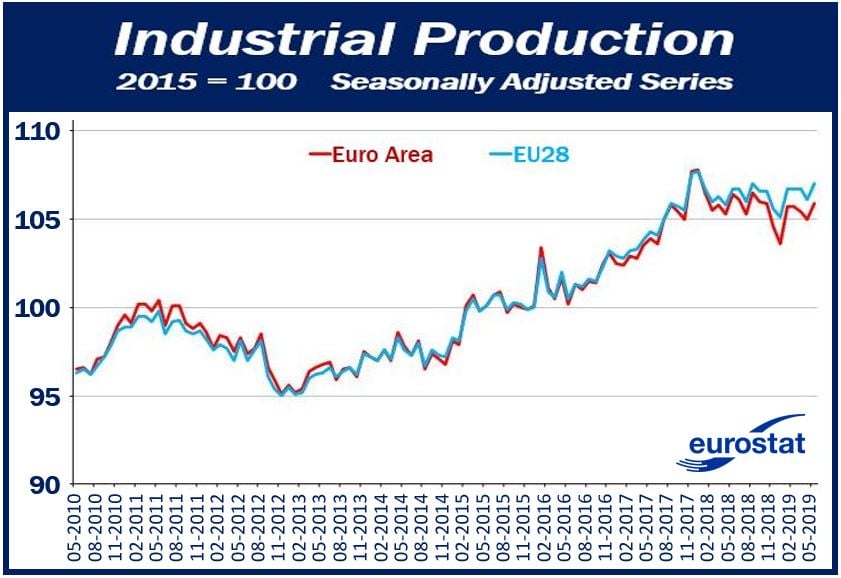Industrial production increased by 0.9% in the euro area in May 2019 compared to the previous month, according to an estimate from Eurostat. Eurostat is the European Union’s statistical office.
The EU28 saw industrial production grow by 0.8% in May compared to April.
In April 2019, industrial production had fallen by 0.4% and 0.6% in the euro area and EU28 respectively.

What do euro area and EU28 mean?
The euro area refers to the European Union countries whose currency is the euro. The EU28 includes all the European Union members, i.e., both those whose currency is the euro and countries that have kept their national currency, such as the UK and Denmark.
Compared to May 2018, however, industrial production in the euro area in May 2019 was 0.5% lower, while in the EU28 it was 0.4% higher.
Main industrial groups – May 2019 vs. April 2019
In the euro area, the production of non-durable consumer goods rose by 2.7% and durable consumer goods increased by 2.3%. Capital goods and energy grew by 1.3%m and 0.7% respectively, while intermediate goods declined by 0.2%.
The production of capital goods in the EU28 increased by 1.9%, non-durable goods by 1.5%, durable goods by 1.7%, and energy by 1.5%. Intermediate goods declined by 0.1%.
Countries
The greatest increases in industrial production occurred in Denmark +4.4%, Ireland +2.3%, and France +2.1%. The greatest decreases were in Finland -2.9%, Romania -1.9%, and Croatia -1.7%.
Main industrial groups – May 2019 vs. May 2018
The production of intermediate goods in the euro area dropped by 2.6%, while capital goods fell by 0.7%. Durable consumer goods grew by 0.4% while energy rose by 0.8%. Non-durable consumer goods registered an increase of 3.1%.
In the EU28, the production of non-durable consumer goods went up by 2.8%. Both energy and durable consumer goods were up by 1.7% and 1.2% respectively. Capital goods declined by 0.1%. Intermediate goods were also down (1.4%).
Countries
The largest increases occurred in Denmark +12.5%, Ireland 8.2%, and Hungary +6.1%. The greatest decreases occurred in Malta -5.1%, Germany -4.3%, and Romania -2.3%.
What are consumer goods?
Consumer goods are goods (products) that we buy and do not use to make other things or sell on. We also refer to them as final goods.
Durable consumer goods, such as TVs and refrigerators, last a long time. Non-durable consumer goods, such as shampoo, soap, and food, do not last long.
